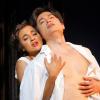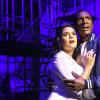Though he originally wanted to be a Korean pop star, tenor Duke Kim, who was born in Seoul but immigrated with his family to Orange County at 14, decided instead to go the operatic route. Indeed, after making a notable debut with Los Angeles Opera last November as the lead in Romeo and Juliet, the singer returns to the Dorothy Chandler Pavilion to sing Tony in Leonard Bernstein’s West Side Story from Sept. 20 – Oct. 12. While the production isn’t new — it was co-commissioned with Lyric Opera of Chicago, Houston Grand Opera, and the Glimmerglass Festival — it is new to LA Opera.
It’s been a busy few years for Kim, who was a grand finals winner of the Metropolitan Opera Laffont Competition in 2021 and placed second in both Operalia and at the inaugural Juan Pons International Singing Competition the following year. He booked numerous gigs afterward, making debuts with the Seattle Opera in La traviata and in productions of Romeo and Juliet with the Glimmerglass Festival, Florentine Opera, and Opera San Antonio.
The 2024–2025 season proved even busier, with Kim bowing at the Metropolitan Opera as Tamino in The Magic Flute, and at the Santa Fe Opera as the Duke of Mantua in Rigoletto. The season’s other engagements included debuts at the Semperoper Dresden, Teatro de la Maestranza, and the Festival d’Aix-en-Provence.
A graduate of Chapman University and the Shepherd School of Music at Rice University, Kim, 33, is also a recent alumnus of the Cafritz Young Artist Program at the Washington National Opera, as well as of Houston Grand Opera’s Young Artist Vocal Academy.
SFCV caught up with Torrance-based Kim between rehearsals and took a deep dive into West Side Story, how he prepares for a role, and what he thinks about contemporary operas.
Is it true that you chose Duke as your English name based on the actor Channing Tatum’s character in the film, She’s the Man, and because your first name, Yeon Jun, was difficult to pronounce?
That’s all correct. I moved to the States in the summer [of] 2006 trying to learn English and watching these movies. I thought it was a cool name.
And it is! This is your first time doing West Side Story and Music Director James Conlon’s first time conducting the work. Have you worked with him before?
I have not. I’ve only met him a few times. But he’s been wonderful and [is] already dropping so much wisdom during the rehearsal process. It surprised me that it’s also his first time conducting West Side Story, and he has so many musical and dramatic ideas to share. It’s adding to my interpretation of the role.
Since you’re probably familiar with the film, the musical, and the many remakes of this classic, what are your thoughts on singing the role of Tony, how does that correlate with your having also sung Romeo, and what aspects of Tony’s character did you find most challenging to portray?
I’ve sung some numbers from the musical — “Maria” and “Tonight” — but had not seen the movie until I was studying the musical.
I find that Romeo and Tony are so similar, except with one difference: Tony was actively distancing himself from “the family” — his gang — but Romeo was very much part of the family. The only differences that I see, similar to me personally, [is] the way I love someone. I’m all in — the way Tony feels love, and later anger, and all that.
I’m not an angry person, but the only thing that makes me angry is when someone messes with someone I love. That’s similar to Romeo and Tony. Both of their music is so earnest and so close to the heart. It really speaks to me naturally.
You’re saying, then, that it’s not easy to relate to the anger of these characters?
It never really shows in me as a person. In my daily life — even when I’m angry — I channel it through my workouts or go on a run. I rarely confront it directly, unless it must be done. Doing it in front of an audience, however, is quite vulnerable and scary to me. On the flip side, once I do it, I feel this emotional release. Probably because I don’t release it in my daily life, when I get to do it through singing and acting, it’s cathartic.
How do you prepare for a role, in this case Tony? Do you begin with the libretto, the score, or something else?
I watched the movie first, then started with the dialogue. I have limited experience with straight dialogue. It’s similar to learning opera with recitative; it’s the hardest. For most singers, the recitative takes the longest to stay in your body and become organic [like] the arias, the ensembles. Because you have the music as the structure, it’s quicker to hold onto in your singing.
I want to be familiar with the whole artwork. The soundscape is so diverse and so different. The tempi, the colors, the usages of instruments, [and] the voices are all so different.
Have you worked with Gabriella Reyes, who sings the role of Maria, before? How have you built good chemistry between your characters?
We have not worked with each other before, but we met at the Houston Grand Opera’s Young Artist Vocal Academy nine years ago. We’ve been friends for a while, and it’s great to see her. She’s a wonderful colleague, a warm person. With any good colleague, it’s easy to build rapport and camaraderie, and from that comes good chemistry.
Francesca Zambello originally directed this production of West Side Story, and Jerome Robbins made the iconic choreography, which is “reproduced” here by Joshua Bergasse. Had you worked with Zambello before, how much dancing do you do, and how does movement inform your performance as Tony?
I was a young artist at Washington National Opera, where Cesca [Zambello] is the artistic director. I also did Romeo and Juliet at Glimmerglass [in August 2023], where they brought in Simon Godwin, and Cesca was there to help a little bit, so I got to work with her there, as well. For this production, [Associate Director] Eric Sean Vogel has done this show many times and has many insights.
Dancing-wise, we don’t have a lot. Maria and I have our meeting scene cha-cha. But the choreography that the dancers do is amazing — for the energy they bring and the way they move. I do like to move, especially when portraying a character. At the same time, though I’m not a teenager anymore I have the soul and the heart of a loving teenager.
It’s no secret that the themes in both Romeo and Juliet and West Side Story — love, violence, and identity — are as relevant today as they’ve ever been. How do you think this production speaks to today’s audiences?
The topic at hand is universal, and I think it will be for the foreseeable future. This story of love, conflict because of different backgrounds, it’s part of human nature. I think nowadays, people are dealing with it in a more civil way. Hopefully when people see this, it could help [them] come together.
You’re still young, but what roles would you like to sing that you haven’t, and what about contemporary operas? You’re singing the role of Nikolaus Sprink in Kevin Puts and Mark Campbell’s Pulitzer Prize-winning 2011 opera, Silent Night next January and February at Houston Grand Opera.
My dream roles now are Werther and Rodolfo [La bohème]. Rodolfo has been my dream since I started being interested in opera. Whether these two roles will happen is not up to me; it’s how I sing and how the voice grows. If I have a career with five roles I sing really well, [so] when people think of a role and think of casting me, that’s [fine].
For contemporary opera, it depends on how it’s written. Puts definitely knows how to write for the voice. The score is beautiful, powerful, gripping music, and written well for the voice. As a singer, it’s all I can ask. There is still a melody where you can follow where the music is going.
I’m not a fan of contemporary music for the sake of creating something new. That misses the point, [which] is to communicate emotions and stories with the audience. There has to be some kind of beauty, too. When music gets scientific and mathematical, I zone out pretty quickly. But I’m always up for trying new things. We still have to put out new operas and new music, otherwise the art form is stagnant.




